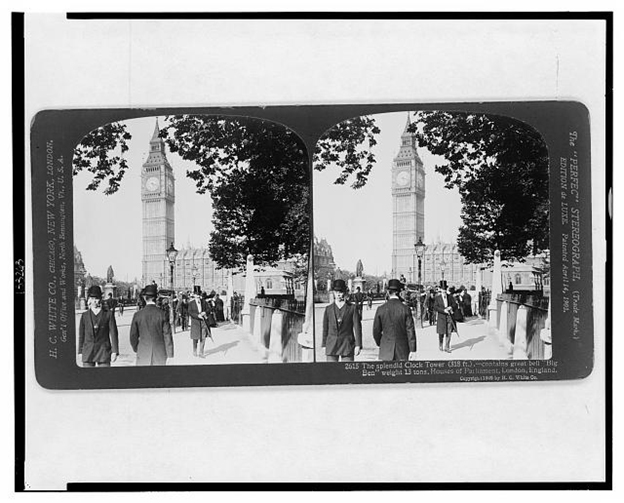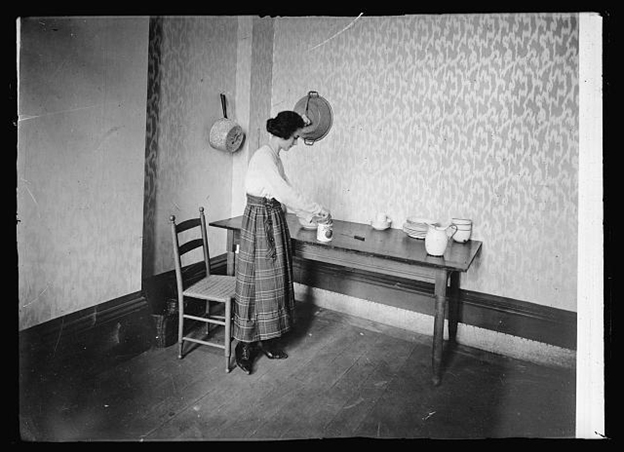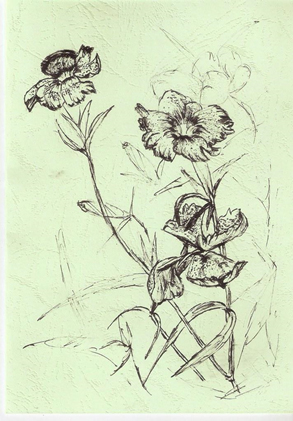Through a cross-disciplinary analysis of Virginia Woolf’s Mrs. Dalloway, Shivani Sawant investigates themes of domestic melancholia, patriarchal oppression, class structure, and intersectional identity. Engaging texts from queer feminist scholar Sara Ahmed and Freudian scholar David Eng with Woolf’s narrative, Sawant highlights main character Mrs. Dalloway’s privilege in her coinciding ignorance and romanticization of her unfulfilled life. Sawant deconstructs the identity of the white, upper-class housewife as a simultaneous victim of misogyny and benefactor of racial and class advantages, emphasizing the privilege in experiencing a dissatisfaction so comparably mild that one is capable of ignoring it. –Elina Gordon-Halpern ‘23, editorial assistant
Meaning in the Minutiae: Melancholia and Privilege of the Twentieth-Century Housewife
Shivani Sawant ’25
Like many works of literature born from the Modernist movement, Virginia Woolf’s Mrs. Dalloway sought disrupture. Woolf peeled away from the Edwardian, or pre-war, ways of examining the human condition — rather than focusing on expansive plots or worlds, Woolf found that we can uncover larger truths regarding society and human nature by examining a character’s thoughts as they move through daily moments. The book thus spans a simple day in the life of Clarissa Dalloway, a housewife who herself pays exceedingly close attention to the mundane moments of her life. Clarissa’s continual romanticization of her life and labor — and her insecure resentment of her daughter’s lower-class tutor — reveal not only the melancholia of the housewife in upper-class twentieth-century English society, but also its inextricable link with privilege and willful ignorance.
Woolf demonstrates the melancholia of the twentieth-century housewife through Clarissa’s continual fixation on the beauty and meaning in the mundanities of life. Even when running an errand as simple as buying flowers for her party, Clarissa pauses as Big Ben strikes in the street, reflecting on time and remarking how “one loves it so…making it up, building it round one, tumbling it, creating it every moment afresh…for that very reason: they love life” (Woolf 4).

Woolf uses long, winding syntax to show how Clarissa stretches out ordinary, brief moments like the chiming of a clock. The action verbs of building, tumbling, and creating simulate how Clarissa picks at and stretches out the mundane, shaping everyday moments to be larger and more meaningful until she herself can believe that she “love[s] life” (Woolf 4). By fixating for so long on the momentary strike of a clock, Woolf exaggerates Clarissa’s attention to detail, hinting at Clarissa’s melancholia through her conscious romanticization of the miniscule. Sara Ahmed, a feminist and queer theory scholar, explores the topic of this general unhappiness in literary housewives: “opening up the world, or expanding one’s horizons,” she writes, “can thus mean becoming conscious of just how much there is to be unhappy about” (Ahmed 585). In her efforts to avoid this unhappiness, Clarissa actively avoids “opening up the world”; rather than “expanding” her “horizons,” she zooms in on the granular. She creates universes of thought in each moment to fend off the awareness that her life is limited to such moments.
Clarissa’s refusal to become conscious of the confines of her lifestyle is indicative of a much larger, collective melancholia that psychologist Sigmund Freud had connected strongly to the female condition in the twentieth century. Literary scholar David Eng writes that Freud defined melancholia as “a pathological form of mourning” where the melancholic subject is “unable ‘properly’ to grieve the loss of an object, a place, or an ideal…languishing instead in the refusal to grieve” (Eng 3). Clarissa, like countless other housewives in twentieth-century English society, grapples with a death of possibility: she will never know what she could accomplish or become if she was not confined to the constrained role of a housewife. Furthermore, as Freud stated, proper grief for this loss was rare because it was considered so normative in society that often it did not even register as real. Wanting a world beyond marrying, raising children, and throwing social events was unheard of for housewives because it was all society expected of them. Even if Clarissa were to become conscious of the limits of her situation, she would, as Ahmed points out, sink into despair because she would be conscious of her suffering, but powerless to change her circumstances. The housewife is suspended, then, in the liminal space of melancholia: she is aware, on some level, that she is unhappy, but continually romanticizes her life to avoid confronting this unhappiness (Eng 3).

Clarissa’s romanticization of life in efforts to cope with her melancholia extends to her domestic life, as well. Not only does Clarissa romanticize the outside world to the point of drawing sweeping reflective thoughts out of a clock chiming in the streets, she searches for meaning and purpose in her own private domestic world. Woolf displays this romanticization and its importance to Clarissa with reverent, borderline religious diction, lingering on how Clarissa returns home and checks the telephone pad. As Clarissa bows her head listening to her household, she feels “blessed and purified” and compares “moments like these” to “flowers of darkness” (Woolf 29). Once again, Woolf elongates her sentences, choosing euphonious diction to show how Clarissa tries to glorify her domestic life. Even so, Clarissa’s dissatisfaction leaks through this veneer of purported blessedness. Though she tries to see these moments in her life as beautiful flowers, they are still “flowers of darkness”; she still sees them as dim and dissatisfying. Woolf thus continues the tension of Clarissa being distantly aware she is unhappy yet doing everything in her power to mute this discontentment.

As Woolf further shows Clarissa’s idealization of her domestic life, she reveals how it extends to her idealization and thus privileged ignorance of lower-class labor. After checking the telephone pad and soaking in the sounds around her, Clarissa considers her household to be “a secret deposit of exquisite moments,” declaring that one must “repay in daily life to servants, yes, to dogs and canaries” (Woolf 29). As an upper-class housewife married to a rich politician, Clarissa’s domestic world is inextricably linked to labor. In romanticizing this world, Clarissa romanticizes this labor, exhibiting ignorance toward the hard, extensive work that lower-class servants have to do to maintain her household. Though she says she wants to “repay in daily life to servants,” she immediately follows it with “yes, to dogs and canaries,” implying that her servants are just another ornament of her life to gaze at, equatable to animals. Her supposed appreciation of servants is dehumanizing and comes from a place of self-interest; she does not see her servants as individuals equal to her but rather pleasant facets of her household that she idealizes to avoid despairing at the patriarchal boundaries of her life. In trying to appreciate labor, Clarissa trivializes it, showing an astounding lack of awareness of her own privilege. She glosses over her servants’ hard work, not for a moment considering their perspectives or feeling grateful for the elevated position in society that allows her to benefit from their work.
Clarissa’s venomous relationship with Miss Kilman, her daughter’s tutor, breaks through Clarissa’s state of melancholia, revealing staggering privilege and ignorance as she is forced to confront her repressed dissatisfaction as a housewife. Though Clarissa successfully maintains her veneer of contentment throughout the novel by constantly trying to uphold a positive attitude and idealizing the world around her, she feels an acute hatred for Miss Kilman that she cannot suppress. This crack in her constructed happiness is made evident when she lists out her grievances against Miss Kilman, starting with Miss Kilman’s green mackintosh coat in which she “perspire[s]” “year in and year out” and how Miss Kilman “was never in the room … without making you feel her superiority, your inferiority; how poor she was; how rich you were,” and ending with her exclaiming “—poor embittered unfortunate creature!” (Woolf 12). Miss Kilman almost exists as a character foil to Clarissa. The heavy, utilitarian coat that she insists on wearing throws a sharp contrast against Clarissa’s dresses; her socioeconomic status as a poor unmarried tutor is staggeringly unlike Clarissa’s as an upper-class housewife; her “embittered” attitude entirely clashes with Clarissa’s kind and sociable demeanor. Miss Kilman, then, is Woolf’s embodiment of unapologetic lower-class suffering. Because Clarissa is always repressing her own dissatisfaction, stuck in a melancholic state of mourning for another life, she feels severe discomfort when confronted with Miss Kilman, who is very aware of her own disadvantaged status in society. Her ignorance leaks through in the way she interprets Miss Kilman’s unashamed lack of privilege as “superiority”; she feels insecure and jealous of Miss Kilman’s acceptance of her own suffering because she is forced to confront the falseness of her own constructed veneer of contentment and happiness. However, Woolf makes clear the inherent privilege in this very attitude — while Clarissa is confined to frivolous activities as a housewife in patriarchal upper-class English society, her elevated position in said society provides her the privilege of being able to prioritize these activities, rather than having to work to survive. In a sense, Clarissa makes Miss Kilman’s lack of privilege about Clarissa’s own melancholia, and in doing so, trivializes said lack of privilege.
Woolf explores the relationship between the melancholia and privilege of the upper- class housewife in twentieth-century English society through Clarissa’s forced romanticization of life and labor, and the way it contradicts her spite-filled confrontations with Miss Kilman. Though the novel was written in 1924, Woolf’s reckoning with the upper-class housewife and the intersectionality of misogyny and privilege remains surprisingly current. The urge to focus on one form of discrimination is common; it is much less satisfying or tidy to explore how a victim of misogyny could be a perpetrator of classism. Yet, this phenomenon persists: many point to privileged white women of today, either chastising them for their discrimination or defending them with the argument that the criticism they elicit stems from a place of misogyny. It is useful to consider the relationship between the sexism these women face and the prejudice they exhibit — how they may be exerting whatever power they have over those with less privilege, or how they have been taught to victimize themselves in a way that fuels their ignorance.
Works Cited
Ahmed, Sara. “Killing Joy: Feminism and the History of Happiness.” Signs, vol. 35, no. 3, University of Chicago Press, 2010, pp. 571–94, https://doi.org/10.1086/648513.
Eng, David L. “Melancholia in the Late Twentieth Century.” Signs, vol. 25, no. 4, University of Chicago Press, 2000, pp. 1275–81, http://www.jstor.org/stable/3175527.
Woolf, Virginia. Mrs. Dalloway. Norton Critical Ed.; W. W. Norton & Company, 2021.
Recent Comments